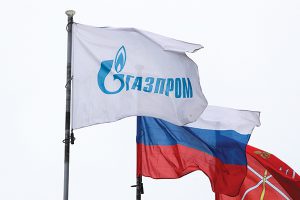Europe’s governments are arguing over how to tighten their economic sanctions on Russia. The main gap in their punitive system is their continuing payments for Russian gas. Germany, especially, has been reluctant to impose a ban because its economy would struggle to cope with the consequences.
Economics suggest a much better approach: Instead of making Russian gas illegal, Europe should make it expensive. Germany’s reluctance to adopt an outright ban is understandable. It imports almost all its gas, and the supply from Russia usually accounts for about half. Sources are difficult to switch (harder than for oil or coal) because the supporting infrastructure is relatively fixed. Businesses and consumers can adapt over time, buying other fuels or economizing, but still: According to one set of estimates, abruptly ending Russian supplies would cut Germany’s gross domestic product by between 2% and 3%. (For comparison, the pandemic caused a contraction of about 4.5%.)
Daniel Gros of the Centre for European Policy Studies has been making the case for a high tariff, as opposed to an outright ban. His logic is compelling. A tariff would raise prices for Europe’s consumers, but they would not have to bear its full cost. To maximise its profits, Gazprom would have to absorb some of the increase. In effect, the tariff would scoop up some of its so-called rent — arising from the difference, at the margin, between what it gets paid and its costs of production. Europe could then use these tariff revenues for other purposes, including compensating consumers for having to buy more expensive gas.
The ideal tariff would be calculated in two stages. First, work out what maximises the difference between the revenue collected and the economic losses imposed on consumers; second, factor in the desire to punish Russia above and beyond what that first calculation requires. For instance, suppose Europe were willing to surrender one euro of net economic benefit to raise the penalty on Russia by one euro: Gros calculates the tariff would be 60%.
A tax that high would be enough to cut the income of Gazprom, the sole supplier of Russian gas, by more than three-quarters. The fall in the amount of Russian gas imported would be much smaller, reducing the initial blow to consumers, and the revenues collected would still be sufficient to make Europe’s consumers whole. By making Russian gas more expensive to consumers, the tax would also create longer-term incentives to switch to other suppliers.
What’s the case against? It’s hard to see one. True, on the face of it, discriminatory tariffs of this kind are illegal under the terms of the World Trade Organization — but the rules provide an exception for national security. Russia’s war on Ukraine, not to mention threats of nuclear retaliation against its allies, would seem to qualify. Maybe Russia would sue for remedies, casting itself a defender of international laws and norms. That would be worth a laugh, at least.
—Bloomberg
 The Gulf Time Newspaper One of the finest business newspapers in the UAE brought to you by our professional writers and editors.
The Gulf Time Newspaper One of the finest business newspapers in the UAE brought to you by our professional writers and editors.
